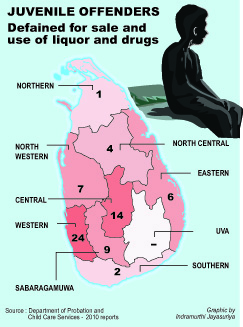News
Schoolchildren fed drugs through ‘laced’ soft drinks in new criminal push
Separate incidents this week in which schoolchildren became ill after consuming “laced” soft drinks reinforce concerns of drug pushers leading youth into addiction through sweets and fizzy drinks doctored with hallucinogenic substances.

Deadly colourful bottles of drink. Pix by Athula Devapriya
Three schoolgirls from a reputed school in Maharagama suddenly became illon Thursday after consuming a soft drink purchased from a shop near their school, police said.
The shop was raided soon after the principal complained to police and the Excise Department that the children were in a state of drowsiness and appeared to be drugged.
The three girls – all aged 14 years – were admitted to Kalubowila Hospital with signs of intoxication as well as vomiting and gastric reaction.
Maharagama police arrested the vendor and sent samples of the drinks to the Government Analyst Department.
In another incident on Thursday, several students in Kotte suddenly started behaving in a boisterous manner and then fell ill after consuming a soft drink along with toffees and chewing gum distributed free of charge.
Police are awaiting a report on samples sent to the Government Analyst.

CAA Director Chandrika Thilakaratne
The incidents came as the Consumer Affairs Authority (CAA) and police raided shops, warehouses and wholesale outlets selling unauthorised soft drinks suspected to be causing hallucinogenic effects.
The raids were carried out areas including Pilimatalawa in Kandy, Gampaha, Negombo, Kotte, Navinna, Maharagama and Pettah.
CAA Director Chandrika Thilakaratne said that in a raid at Sapugaskanda in the Gampaha district on June 30 officials had found 300,000 bottles of a fruit-flavoured drink in a secluded building.
A brand name and expiry date were printed on the boxes of drinks but the bottles themselves had no name, expiry date or details of importer and distributor.
The soft, pliable bottles contained a spray mechanism that allow users to spray the drink into their mouths. Ms. Thilakaratne said the construction of the bottle allowed a vendor to adulterate the drink.
The CAA sent three boxes of the jelly drink to the Dangerous Drugs Authority to check on the possible presence of a narcotic in the drink.
Ms Thilakaratna said raids in Negombo and the Pettah Markets netted thousands of other spray drinks with a product name and information in English.
As well, more than 2,700 packets of a tobacco-based drug powder containing an unidentified chemical were found at a shop at Wolfendhal Street in Pettah during a raid by the Excise Department on Monday.
The drugs were intended for sale to children, officers said. The powder, in green packets, had an estimated value of Rs. 600,000.The National Child Protection Authority (NCPA) is training its officials to educate the public, especially young people, against drug use, Chairperson Mrs. Natasha Balendra said.
She said the public must be aware that drug peddlers were keen to promote drugs to children in order to build a new client base. She confirmed that the peddlers’ most recent tactic is to introduce drugs in beverages sold in spray bottles.
“We should teach children that drugs are not to be used as anti-stress agents but are substances that cause depression and destroy their future,” Mrs. Balendra said, adding that parents and teachers should reduce the pressures that tell on children during their schooling.
Former Police Narcotics Bureau (PNB) chief and Deputy Inspector-General of police, Anton Jeyanathan also warned that drug peddlers were using new inventive ways to market their products to children.
“The police take action on drugs after they are smuggled into the country; we should stop it entering the country,” he said, suggesting greater use be made of navy patrols to stop smuggling rings.

